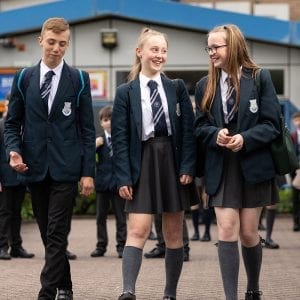Drama
Vision
At Birchwood, we want our students to feel confident speaking publicly. We want to cultivate an environment in which students to feel safe to express themselves, as well as challenging social and cultural beliefs.
At the heart of our curriculum is understanding the historical and political underpinnings in drama and exploring how this has developed over time. We want to show students where theatre came from, be exposed to different styles of theatre, and learn how to devise theatre using techniques and styles. Each year will build on what they have learnt previously, and students will feel safe to express themselves in a safe and supportive environment to develop confidence, communication, and teamwork.
We want students to feel comfortable performing. We want to build on and develop the following transferable skills at KS3: communication, confidence, teamwork, leadership, listening, responding, creativity, critical thinking, problem solving time management and empathy.
The aim to develop their spoken language through our Drama curriculum and to develop confidence in speaking so they contribute effectively in all lessons.
We aim to foster a love for Drama and provide a foundation so they will want to progress to KS4 and have the skills they need to achieve at KS4.
How do we build on what students learn at KS2?
We want to ensure that our students are thoroughly supported in their transition from KS2 to KS3 drama. In order to do this, we work with local primary schools so that our curriculums complement one another. We also, in year 7 particularly, prioritise revisiting and rebuilding on the following:
- Ensuring that students are confident speakers who can talk in front of various groups of people, including those they are less familiar with.
- Encourage students to speak competently in front of others for different purposes.
- Encourage students to read aloud fluently with the correct expression, volume, pace and phrasing.
- Perform drama by adopting, creating and sustaining a range of roles.
- Use discussion to develop learning in small groups and to contribute to whole class discussion to develop their confidence to present and perform and to listen and talk attentively.
How do we cover the KS3 National Curriculum and beyond?
In each year group we cover and build upon the following key aspects of the spoken language section from the English Key Stage 3 Curriculum:
- Speaking confidently though classroom discussion.
- Participating in formal debates and structured discussions.
- Performing short speeches and scenes and allowing them to feed back their own ideas.
- Improvising, rehearsing, and performing play scripts.
- Discuss language use and meaning.
Through KS3 Drama, we cover elements of the English KS3 National Curriculum by covering the following throughout Year 7, 8 and 9. With the man focus on spoken English. Students are taught to speak confidently and effectively through using standard English confidently through classroom discussion, enabling them to present and deliver short speeches through expressing their own ideas and participating in structured discussions. Students over the three years will have the opportunity to improvise, rehearse and perform play scripts to generate language experimenting with intonation, tone, volume, mood, silence, stillness, and action to add impact.
Key Stage 3 Drama is part of a rotation with the other DCP subjects. Each year group gets 18 hours across the year. Throughout the rotation they will study the following:
- Year 7: They will read about where theatre began, understand how theatre has evolved and be exposed to British play wrights such as Shakespeare, Oscar Wilde and Willy Russell they will look back in History at the bubonic plague and how it affected a village and the social issues that arose. They will read about the early age of musical theatre and delve into the Victorian underworld through studying the musical Oliver Twist. They will be exposed to new vocabulary through the topics covered. Students will learn about the staging of plays in the early 16th Century and the impact this can have on the interpretation of play. Throughout the eighteen lessons they will have the opportunity to write and perform scripts and other imaginative writing and use the style of a news report to put forward arguments and show their understanding and knowledge.
- Year 8: Students will read two different play scripts ‘Teechers’ by John Godber and ‘Blood Brothers’ by Willy Russell they will understand setting, play and characterization and the effects of these. They will read about the style of Theatre called ‘Theatre in Education’. They will annotate play scripts and write their own Theatre in Education script. Though the eighteen lessons they will learn new vocabulary and understand the role of an audience and the effect and influence an audience has on a script. This year will give them the knowledge of different theatre practitioners and skills and styles that can be used to create original drama. This gives them a solid foundation for the skills and knowledge they need for GSCE Drama.
- Year 9: students will study the play DNA by Dennis Kelly and The Crucible by Arthur Miller. Expanding their knowledge of play wrights, theatre practitioners and their techniques, history, and societal issues from past and present. They will explore and develop their understanding of the setting, the plot and characterization and the effects of these. They will rehearse and perform the plays DNA and The Crucible to develop confidence in their speaking. Students will have the opportunity to present their ideas and opinions through issue-based Drama through giving short speeches and presentations and creating documentary style drama.
Beyond this, we cover:
- Annual school musical production which allows all year groups to take part on stage and backstage.
- Coram Shakespeare Schools Festival is offered to Year 9 students.
- Theatre trips.
- Annual DCP trip to London to allow students to experience the culture and arts that the city offers.
- All students have access to Digital Theatre where they can access recordings of Live theatre.
- Key Stage 3 Drama Club.
- Key Stage 4 Drama Club.
- Drama taster days.
- Drama work – shop days run by industry professionals.
- PA Summer Show Case Celebration Evening.
- Links with Drama professionals – Paper Birds and N Act Theatre.
What do we cover in KS4 and how do we aspire towards KS5?
Year 10: WJEC Eduqas GCSE Drama
Component 1: Devising Theatre 40% – Non – exam assessment: Internally assessed, externally moderated.
Learners are assessed on either acting or design.
Learners participate in the creation, development and performance of piece of devised theatre using either the techniques of an influential theatre practitioner or a genre, in response to a stimulus set by WJEC.
Learners will produce:
- A realisation of their piece of devised theatre.
- A portfolio of supporting evidence.
- An evaluation of their final performance or design.
Learners will work in groups of between two and five performers.
Preparation for Comp 3 Exam: Interpretating Theatre 40%
Written examination: 1 hour 30 minutes
Section A: Set text ‘Noughts and Crosses’ by Malorie Blackman, students answer a series of questions as an actor, designer or director.
Section B: Live Theatre Review, students answer one question from a choice of two, requiring analysis and evaluation of one live theatre production seen during the course.
Year 11: WJEC Eduqas GCSE Drama
Prep for Comp 3 (see above)
Component 2: Performing from a Text 20% (assessed by a visiting examiner)
Learners participate in a performance based on two 10-minute extracts from a performance text of their own choice.
Learners will be assessed on either acting or design and work in groups of between two and four.
Year 11: BTEC Tech Awards 2022 – Component 3: Responding to a Brief – externally marked. 40%
Learners apply their skills and techniques creatively to a workshop performance for a selected audience. Learners will capture their ideas on planning, development and effectiveness of the production process in a written log and an evaluation report. They will:
- Understand how to respond to a brief.
- Select skills and techniques in a workshop performance in response to a brief.
- Evaluate the development process and outcome in response to a brief.
We want to ensure that our students aspire to study drama in the future and understand the careers available to them, in this field.
To ensure that students understand the variety of options open to them, we:
- Careers/ challenge/ A level links
- Trips
- Support with the Coram Shakespeare Schools Festival
- Regular performance evenings
- Stagehands for school show
- Learn the technician side of putting on a show.
- Outside organisations come in and deliver work – shops.
- Strong links with professional actors.





